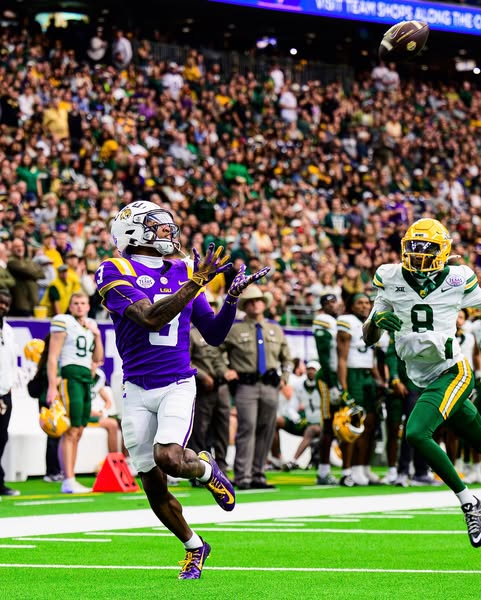LSU Wide Receiver Chris Hilton Jr. Ranked No. 32 on 2025 College Football Freaks List, Blazing Speed and Athleticism Signal Breakout Season Ahead
Chris Hilton Jr. isn’t just fast—he’s record-breaking fast. As he gears up for the 2025 college football season with LSU, the dynamic wide receiver has been officially named No. 32 on the coveted annual “College Football Freaks List” by Bruce Feldman of The Athletic, a ranking that highlights the most athletically gifted players in the sport. The recognition doesn’t just reflect Hilton’s elite physical tools; it confirms what LSU coaches and insiders have been saying for months: Chris Hilton Jr. is primed for a breakout year, and the rest of college football should take notice.
The College Football Freaks List, now an annual staple of the preseason landscape, has become the definitive barometer for identifying players whose athleticism borders on superhuman. It isn’t just about weight room numbers or 40-yard dash times—it’s about raw potential, upside, and the kind of explosiveness that can flip games in an instant. For Hilton, his placement at No. 32 is a nod to the fact that he possesses all of those traits and more. Feldman’s report specifically highlights Hilton’s GPS-verified top speed of 23.7 mph—the fastest ever recorded by an LSU player—and a high 4.2-second 40-yard dash, numbers that wouldn’t be out of place at the NFL Combine.
That kind of speed doesn’t just turn heads; it turns plays into touchdowns. Hilton’s elite velocity, combined with crisp route-running and improved hands, gives LSU an instant deep threat every time he lines up. In an era where explosive plays define championship offenses, Hilton provides exactly what Brian Kelly and offensive coordinator Joe Sloan need to stretch defenses, force coverage breakdowns, and create separation for other receivers in the Tigers’ arsenal.
Chris Hilton’s journey to this point hasn’t been without adversity. A former four-star recruit out of Zachary High School in Louisiana, Hilton entered LSU with sky-high expectations thanks to his track background and highlight-reel speed. But his early collegiate years were hindered by injuries and depth chart congestion, forcing him to wait for his opportunity. Rather than transfer or fade into the background, Hilton kept grinding—adding muscle, sharpening his technique, and staying locked in during practices and limited game action.
That persistence is paying off in a major way. Coaches have repeatedly praised Hilton for his work ethic and patience, noting that his time away from the spotlight only fueled his hunger to improve. Now, fully healthy and more confident than ever, Hilton is turning heads every day in practice. Teammates have spoken about his sudden acceleration, his ability to track the deep ball effortlessly, and his newfound consistency catching in traffic. Even NFL scouts attending LSU’s spring and summer workouts have circled his name as one to watch.
The numbers back up the buzz. In LSU’s internal speed tracking system, Hilton set the program record by hitting 23.7 miles per hour on the GPS—a velocity usually reserved for Olympic-level sprinters. For context, Tyreek Hill, the NFL’s fastest receiver, maxes out around 23.2 mph on game-day GPS tracking. That Hilton has eclipsed that threshold is a testament to both his natural gifts and the work he’s put in under LSU’s strength and conditioning program. Pair that with a verified high-4.2 time in the 40-yard dash and you’ve got a receiver who can take the top off any defense in the country.
Speed, of course, is only one piece of the puzzle. Hilton has spent the offseason refining his route tree, improving his release against press coverage, and becoming a more complete receiver. Coaches say he’s now capable of lining up anywhere on the field—from the slot to the outside—and is comfortable running everything from slants and digs to go-routes and double moves. His versatility makes it harder for opposing defenses to key in on him, especially in an offense that already features playmakers at every skill position.
That’s good news for an LSU team looking to recapture the offensive firepower of recent years. With Garrett Nussmeier taking over at quarterback and a reloaded offensive line, the Tigers have the pieces in place to make a legitimate run in the SEC. Hilton’s emergence adds a new dimension to that attack. Defenses may focus on LSU’s returning stars, but they’ll have to account for No. 17 streaking down the sideline—because if they don’t, the ball will already be in the air, and Hilton will be in the end zone before they even turn around.
One of the most exciting aspects of Hilton’s rise is how it reflects the broader philosophy shift in LSU’s player development. Under Brian Kelly, the program has emphasized not just recruiting talent, but maximizing it through performance science, individualized training, and data-driven coaching. Hilton is a case study in how that approach can pay off. Rather than rushing him onto the field before he was physically or mentally ready, LSU took the long view—building him up, managing his recovery, and preparing him to contribute at a high level when his time came.
Now, that time is here.
Hilton’s recognition on the Freaks List also puts him firmly on the radar for NFL scouts and draft analysts. Though he still has eligibility remaining, his unique combination of speed, size, and character could push him up draft boards quickly if he delivers a productive season. Explosive receivers with track speed are always in demand at the next level, and Hilton’s performance in 2025 could cement him as one of the top wideout prospects in the country.
But awards and draft projections can wait. For now, Hilton is focused on helping LSU win football games. He’s become a leader in the wide receiver room, mentoring younger players and setting the tone with his preparation. He understands the responsibility that comes with being a starter on a team with national championship aspirations, and he’s embracing that role with maturity and confidence.
Fans will get their first real glimpse of the new-and-improved Hilton when LSU opens the season against Arizona State at Tiger Stadium. Early practices suggest that he’ll be featured heavily in the offensive game plan, particularly on deep shots and play-action concepts designed to exploit his speed. From there, it’s a gauntlet of SEC matchups, including critical games against Alabama, Georgia, and Texas. If Hilton can deliver against that level of competition, his place in LSU history—and possibly on All-American lists—could be secured.
In the ever-competitive SEC, where elite athletes are everywhere, it takes something truly special to stand out. Chris Hilton Jr. has that something. His inclusion on the College Football Freaks List confirms what LSU already knows: he’s not just fast—he’s different. He’s rare. And he’s ready.
As the 2025 season approaches, there’s one thing every defensive coordinator in the conference should keep in mind: when Chris Hilton is on the field, no lead is safe, and no defender is fast enough. The freak is loose in Baton Rouge, and he’s about to set the college football world on fire.



